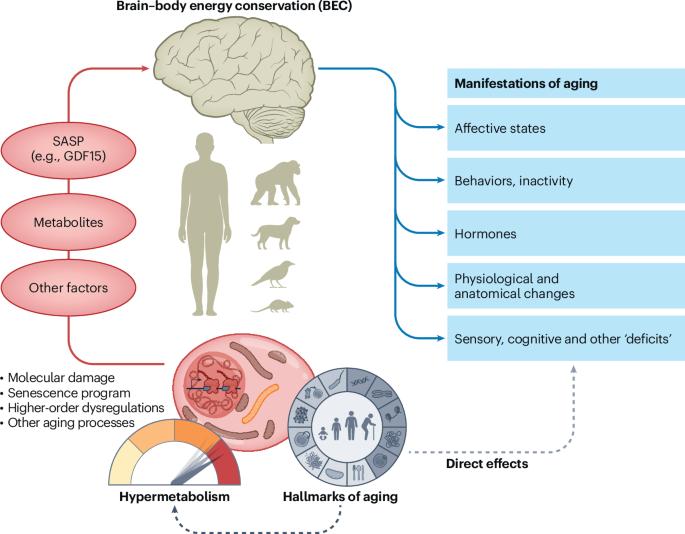The brain–body energy conservation model of aging
IF 17
Q1 CELL BIOLOGY
引用次数: 0
Abstract
Aging involves seemingly paradoxical changes in energy metabolism. Molecular damage accumulation increases cellular energy expenditure, yet whole-body energy expenditure remains stable or decreases with age. We resolve this apparent contradiction by positioning the brain as the mediator and broker in the organismal energy economy. As somatic tissues accumulate damage over time, costly intracellular stress responses are activated, causing aging or senescent cells to secrete cytokines that convey increased cellular energy demand (hypermetabolism) to the brain. To conserve energy in the face of a shrinking energy budget, the brain deploys energy conservation responses, which suppress low-priority processes, producing fatigue, physical inactivity, blunted sensory capacities, immune alterations and endocrine ‘deficits’. We term this cascade the brain–body energy conservation (BEC) model of aging. The BEC outlines (1) the energetic cost of cellular aging, (2) how brain perception of senescence-associated hypermetabolism may drive the phenotypic manifestations of aging and (3) energetic principles underlying the modifiability of aging trajectories by stressors and geroscience interventions. The authors offer a new energy-focused perspective on aging by introducing a brain–body model that positions the brain’s response to cytokine signals of hypermetabolism as a mechanistic link between the cellular hallmarks and organismal manifestations of aging.

脑-体能量守恒衰老模型。
衰老涉及能量代谢中看似矛盾的变化。分子损伤积累会增加细胞能量消耗,而全身能量消耗却保持稳定或随着年龄增长而减少。我们将大脑定位为机体能量经济的中介和经纪人,从而解决了这一明显的矛盾。随着时间的推移,躯体组织损伤不断累积,细胞内代价高昂的应激反应被激活,导致衰老或衰老细胞分泌细胞因子,将增加的细胞能量需求(高代谢)传递给大脑。面对日益缩减的能量预算,大脑会采取能量守恒反应,抑制低优先级过程,从而产生疲劳、体力不支、感觉能力减弱、免疫改变和内分泌 "缺陷"。我们将这一连锁反应称为脑-体能量守恒(BEC)衰老模型。脑-体能量守恒模型概述了:(1)细胞衰老的能量成本;(2)大脑对衰老相关高代谢的感知如何驱动衰老的表型表现;(3)压力因素和环境科学干预可改变衰老轨迹的能量原理。
本文章由计算机程序翻译,如有差异,请以英文原文为准。
求助全文
约1分钟内获得全文
求助全文

 求助内容:
求助内容: 应助结果提醒方式:
应助结果提醒方式:


